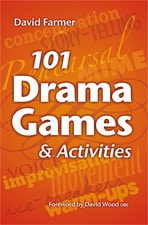Devising Theatre
“Things don’t always arrive by lots of consideration. We think about things, but sometimes they happen by mistake. On the whole most of our work is about the tension between something that is funny and something that isn’t” – Paul Hunter.
“If you know exactly what you are going to do, what’s the point of doing it?” – Picasso.

“It woke me up at four o’clock this morning and I haven’t gone back to sleep… I’m thinking: ‘This is a disaster! I don’t know why I am doing this!’ My stage manager is saying: ‘There are only 10 days to go – when are we going to get a script?’ It’s absolutely petrifying. The script will almost arise in my mouth as the lights go up – like a piece of jazz.”- Simon McBurney.
“Everything moves. Everything develops and progresses. Everything rebounds and resonates. From one point to another, the line is never straight.” – Jacques LeCoq.

“There is no formula to the way we make theatre… It starts with an itch, a need, an instinct… We gaze at books and films, sketch and begin to form a concept; an environment in which the story can live, in which the actors can play. This physical world holds meaning and narrative, it is as much a story telling tool as the written word.”

‘If you’re not prepared to be wrong you’ll never come up with anything original.‘
– Sir Ken Robinson
‘MAKE MISTAKES’ – put this sign on your director’s desk… or if you don’t have a director… hang it on the wall.
‘Life is what happens when you’re making other plans.’
– John Lennon
Getting Started
Devising a piece of theatre can be a stimulating and exciting journey towards the development of a performance which is a fusion of the unique talents and creativity of the group. It is not a direct journey, but one in which you will encounter well-trodden paths, blind alleys and sudden surprises. In order to prepare, the group needs to have a good grasp of improvisatory skills. The following exercise helps students learn to accept each others’ ideas – a concept which is not only useful in improvisation, but essential in developing the dynamics of the group throughout the devising process.
Pair Story-making
Divide into pairs. One person begins by making an “offer” (putting forward an idea) and the partner replies with a sentence that begins “Yes, and…”. Try not to block your partner’s ideas, which can so often happen in improvisation. Instead, build on each other’s suggestions. As soon as confidence develops, you can add in actions. Use the space as much as possible.
A: It’s raining
B: Yes, and I’ve got a large umbrella
A: Let’s shelter under it
B: Yes, and the wind is blowing us into the air
A: We are flying over the sea
B: Yes, and we have landed on an island…
And so on. It can be a very liberating game, especially as we don’t often get the chance to say “yes” to everything! A key concept is that participants should avoid trying to push their own idea at the expense of their partner’s. You can also try the game with both of you saying “Yes, and…”. The literal “Yes” can be dropped completely as soon as acceptance of each others’ ideas begins to become more automatic. In contrast, it may also be worth briefly exploring what happens if one of the partners always says “No”.
Devising Theatre Download by David Farmer coming soon!
Read More:
Devising Theatre
“Things don’t always arrive by lots of consideration. We think about things, but sometimes they happen by mistake. On the whole most of our work is about the tension between something that is funny and something that isn’t” – Paul Hunter.
“If you know exactly what you are going to do, what’s the point of doing it?” – Picasso.

“It woke me up at four o’clock this morning and I haven’t gone back to sleep… I’m thinking: ‘This is a disaster! I don’t know why I am doing this!’ My stage manager is saying: ‘There are only 10 days to go – when are we going to get a script?’ It’s absolutely petrifying. The script will almost arise in my mouth as the lights go up – like a piece of jazz.”- Simon McBurney.
“Everything moves. Everything develops and progresses. Everything rebounds and resonates. From one point to another, the line is never straight.” – Jacques LeCoq.

“There is no formula to the way we make theatre… It starts with an itch, a need, an instinct… We gaze at books and films, sketch and begin to form a concept; an environment in which the story can live, in which the actors can play. This physical world holds meaning and narrative, it is as much a story telling tool as the written word.”

‘If you’re not prepared to be wrong you’ll never come up with anything original.‘
– Sir Ken Robinson
‘MAKE MISTAKES’ – put this sign on your director’s desk… or if you don’t have a director… hang it on the wall.
‘Life is what happens when you’re making other plans.’
– John Lennon
Getting Started
Devising a piece of theatre can be a stimulating and exciting journey towards the development of a performance which is a fusion of the unique talents and creativity of the group. It is not a direct journey, but one in which you will encounter well-trodden paths, blind alleys and sudden surprises. In order to prepare, the group needs to have a good grasp of improvisatory skills. The following exercise helps students learn to accept each others’ ideas – a concept which is not only useful in improvisation, but essential in developing the dynamics of the group throughout the devising process.
Pair Story-making
Divide into pairs. One person begins by making an “offer” (putting forward an idea) and the partner replies with a sentence that begins “Yes, and…”. Try not to block your partner’s ideas, which can so often happen in improvisation. Instead, build on each other’s suggestions. As soon as confidence develops, you can add in actions. Use the space as much as possible.
A: It’s raining
B: Yes, and I’ve got a large umbrella
A: Let’s shelter under it
B: Yes, and the wind is blowing us into the air
A: We are flying over the sea
B: Yes, and we have landed on an island…
And so on. It can be a very liberating game, especially as we don’t often get the chance to say “yes” to everything! A key concept is that participants should avoid trying to push their own idea at the expense of their partner’s. You can also try the game with both of you saying “Yes, and…”. The literal “Yes” can be dropped completely as soon as acceptance of each others’ ideas begins to become more automatic. In contrast, it may also be worth briefly exploring what happens if one of the partners always says “No”.
Devising Theatre Download by David Farmer coming soon!
Read More:
‘Creativity is like a cat – you can’t MAKE IT come to you. In order to catch it you sometimes have to walk away from it.’ – Improbable Theatre
‘Creativity is like a cat – you can’t MAKE IT come to you. In order to catch it you sometimes have to walk away from it.’ – Improbable Theatre
101 Drama Games and Activities
By David Farmer
'Belongs amongst the top 10 books any director or drama teacher should own.' - English Touring Opera
101 MORE Drama Games and Activities
By David Farmer
'This book cheered me up. Buy it and smile. There will be a lot of laughter in your classroom.' - Drama Magazine.
Learning Through Drama in the Primary Years
By David Farmer
'Full of easily accessible advice... clear explanations and inventive suggestions.' - National Drama Magazine.
Playful Plays
By David Farmer
'An off-the-shelf, ready-to-go, high-quality rehearsal process ideal for primary-aged students' - Drama Magazine.
Drop of a Hat
By David Farmer
Lesson plans to bring the curriculum to life: ‘A flexible, varied book filled with engaging drama activities’ – Drama and Theatre magazine.






You must be logged in to post a comment.